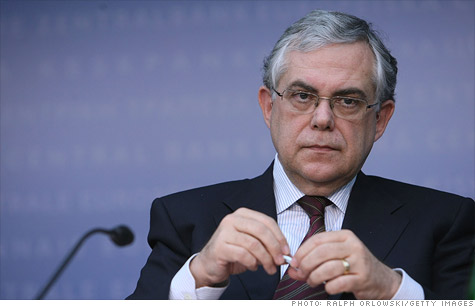Search News

The government of Greek Prime Minister Lucas Papademos has been locked in tough negotiations with its creditors in the private sector over a debt restructuring.
NEW YORK (CNNMoney) -- Greek debt talks are said to be progressing but officials have yet to announce a deal to scale back the nation's overwhelming debt load.
Negotiations between the government and experts representing the private banks and investors that hold Greek debt -- the Institute of International Finance -- have been ongoing since last Wednesday.
But the outcome still remains uncertain ahead of a key two-day meeting of eurozone finance officials that starts Monday.
The lead negotiators from the IIF, Charles Dallara and Jean Lemierre, left Athens Saturday to attend "long-standing personal appointments" in Paris, according to a statement.
In a statement, Dallara stressed that progress has been made over the last few days and that the "elements" of a deal "are coming into place."
"Now is the time to act decisively and seize the opportunity to finalize this historic deal and contribute to the economic stability of Greece, the euro area and the world economy," said Dallara.
The IIF also said Dallara and Lemierre are available to Greek officials by phone "should this be necessary."
At issue is an agreement to reduce Greece's debt load by writing down the value of Greek bonds owned by the private sector by 50%.
In addition to the writedown, the deal is expected to include a debt exchange, in which investors would swap Greek bonds for new 30-year securities with an interest rate, or coupon, of about 4%.
The exchange could result in "real" losses of up to 70% for the private sector.
But it could also ease the burden on the Greek government as it struggles under a massive €350 billion pile of debt and a deepening recession.
The talks have been hindered by disagreements over the terms of the debt exchange and signs the participation rate may fall short of expectations.
The stipulation that investors voluntarily accept the writedowns has also been a stumbling block.
A non-voluntary writedown could trigger credit default swaps, a form of insurance that investors use as protection against a default.
Eurozone officials have insisted that the agreement be voluntary, arguing that credit default swaps could spread chaos in the financial system. But investors who have purchased credit protection might have an interest in holding out for a default.
The private sector owns over €200 billion worth of Greek debt, so the 50% writedown would translate to €100 billion.
That would help shrink Greek government debt to 120% of gross domestic product by 2020, according to eurozone officials. Currently, Greece's debts are equal to about 160% of GDP.
Both sides are under pressure to reach agreement before Monday's meeting of euro area finance ministers, known as the Eurogroup.
The restructuring of Greece's private sector debt is a key condition for the nation to receive additional bailout funds from the European Union and International Monetary Fund.
Greece is facing a €14.5 billion bond payment in March that it may not make without another injection of emergency financing.
Officials from the EU, IMF and European Central Bank arrived in Athens last week to begin reviewing the government's finances.
The troika, as three institutions are known, is beginning the process of negotiating a second bailout for Greece, valued at €130 billion.
Greece has struggled in the past to implement the austerity measures and structural reforms that are a condition of its existing bailout loans.
Prime Minister Lucas Papademos, a former ECB vice president, was appointed last year to impose more budget cuts and revive Greece's moribund economy.
The big concern is that Greece could default in a disorderly way, a development that could force the nation out of the euro currency union.
That would likely cause the Greek banking system to collapse and plunge the nation's economy deeper into recession. It could also drive up borrowing costs for other vulnerable euro area economies, such as Italy and Spain.
The spread of a debt contagion in the eurozone is seen by most economists as the single biggest threat facing the global economy. ![]()
| Index | Last | Change | % Change |
|---|---|---|---|
| Dow | 32,627.97 | -234.33 | -0.71% |
| Nasdaq | 13,215.24 | 99.07 | 0.76% |
| S&P 500 | 3,913.10 | -2.36 | -0.06% |
| Treasuries | 1.73 | 0.00 | 0.12% |
| Company | Price | Change | % Change |
|---|---|---|---|
| Ford Motor Co | 8.29 | 0.05 | 0.61% |
| Advanced Micro Devic... | 54.59 | 0.70 | 1.30% |
| Cisco Systems Inc | 47.49 | -2.44 | -4.89% |
| General Electric Co | 13.00 | -0.16 | -1.22% |
| Kraft Heinz Co | 27.84 | -2.20 | -7.32% |
| Overnight Avg Rate | Latest | Change | Last Week |
|---|---|---|---|
| 30 yr fixed | 3.80% | 3.88% | |
| 15 yr fixed | 3.20% | 3.23% | |
| 5/1 ARM | 3.84% | 3.88% | |
| 30 yr refi | 3.82% | 3.93% | |
| 15 yr refi | 3.20% | 3.23% |
Today's featured rates: